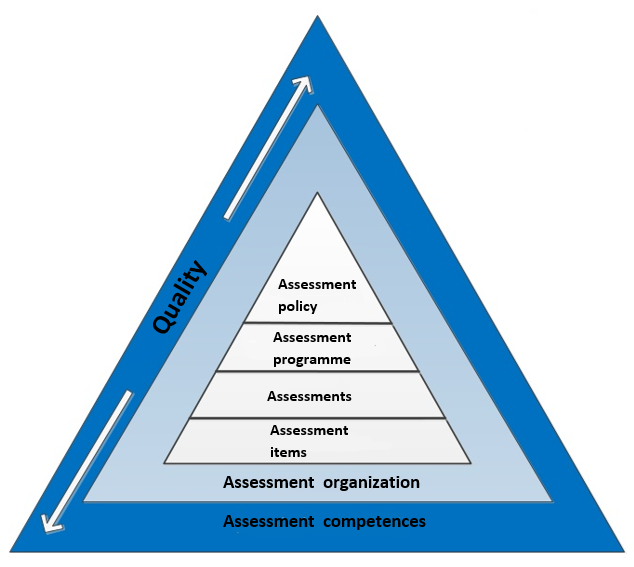There should be no doubt about the value of the diploma. For this reason, study programmes have the task of ensuring the quality of assessment. The Examination Board (EB) of the programmes has the task of safeguarding and guaranteeing the quality of the assessments and final examination. Achieving a satisfactory quality of the assessment requires an interplay of all parties involved.
On the programme level, the quality of assessment depends first and foremost on the quality of and consistency between the individual elements of the assessment: 
- The assessment policy
- The assessment plan or programme (which clarifies the way in which the final qualifications are assessed over the years and which basic principles apply in this respect)
- The used tests and assignments
- The test questions and assessment tasks.
In addition, a good organisation of the testing and assessment process, and the assessment competence of all those involved, are important conditions for the assessment quality.
The aim is to make more sustainable what is going well and to improve what is not yet going well. Critical evaluation and the use of the PDCA cycle are important. With an always open eye for new developments in education and assessment.
A clear assessment policy, set out in a policy document, forms the foundation for this interplay. It provides guidance to all those involved to improve cooperation and coordination and ensure positive contributions to the quality of assessment and education.
Assessment policy on programme level provides a clear picture of the way in which a programme, in line with the educational vision, uses assessment for diagnostic, feedback, and qualification purposes. It also gives an idea of the actors and bodies involved in the assessment process, it describes which rules, procedures, and guidelines apply, and in which way the quality of testing and examination is promoted and guaranteed.
Adoption and successful implementation of assessment policy, ensure that the programme can justify itself in the way in which the assessment takes place, and the quality of the assessment. It can demonstrate, through documentation and practice, that it meets legal requirements and is well-prepared for programme and institutional accreditations.
The management of a study programme uses targeted measures in the implementation process, such as offering instruments, training, and support for lecturers (examiners) and using methods to verify whether the assessments and theses meet expected quality standards.
To read more about points of attention in an assessment policy plan at programme level, see the UT Assessment policy | Level 3: Programme – Programme Director,under "1. Establish an assessment policy for the programme and ensure implementation, monitoring and revision". On this page, besides guidelines, also a toolbox, can be found.
The role of the Examination Board
The Examination Board is not expected to draw up an assessment policy. That will be the task and responsibility of the programme management. Nevertheless, the ExBo may, on request or unsolicited, advise the programme management. For the ExBo, it is important to check whether the policy, as intended, is implemented and effective. Especially in those areas where the quality of the assessment may be compromised if the policy is not followed. Without a defined, documented assessment policy, it will be more difficult for an ExBo to carry out its safeguarding tasks.
* Reference illustration: based on verantwoord-toetsen-en-beslissen-in-het-hoger-beroepsonderwijs-startdocument. Expertgroep BKE/SKE in opdracht van de Vereniging Hogescholen, oktober 2013.
